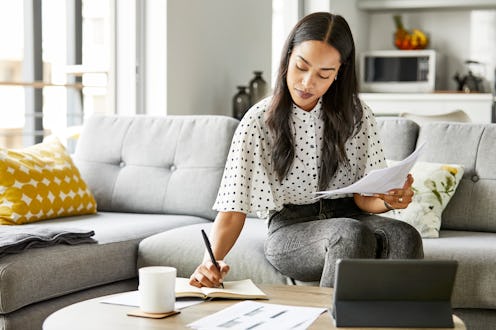Money
How To Start Saving If You Want to Buy a Home In The Next 5 Years
It’s a marathon, not a race.

With record-low interest rates, many would-be buyers are leaping at the opportunity to purchase their first home — even during a pandemic. But before you fall down the Zillow rabbit hole, you’ll want to make sure that you have firm financial footing and prioritize paying off high-interest rate debt like credit card debt and personal loans, Sallie Krawcheck, founder of Ellevest, tells Bustle.
“Credit card debt can charge interest as high as 15% or 25%, which really saps your wealth and ability to save money,” Krawcheck says. You don’t have to pay off your student loans before buying a house, but it’s best to try to get them to a rate of 5%. And continue to contribute to your 401(k) at work.
According to the National Association of Realtors (NAR), single women accounted for 18% of home purchases in 2019, compared to single men’s nine percent. (Married couples make up the largest group at 63%.) But women give up much more to reach their goal: 46% report making financial sacrifices to afford a home, like cutting back on entertainment and clothing, according to data from the NAR.
If you have your sights set on owning property in a specific city or neighborhood in the next five years, here's how money experts say you can start working towards that goal today.
1
Set Up An Emergency Fund
In addition to checking your financial footing, you’ll need an emergency fund of three to six months of take-home pay in a savings account, Priya Malani, founder of Stash Wealth, tells Bustle. “It’s even more vital when you own a home,” she says. “When you actually get into your dream home, there’s a good chance you’re going to get hit with a couple of surprises. Maybe your basement floods when it rains, the previous owner didn’t keep the HVAC unit as clean as it needed to be, or the furnace breaks in their first year.”
2
Figure Out How Much You’ll Need
Think about how much rent you’re paying now, and then decide whether you’re trying to stay in a similar range or can spend more, Malani says. Then use an online mortgage calculator to enter your desired monthly spend and you'll see what you can afford based on various down payment amounts.
“Once you have a good idea of what you'll be spending, work backward to determine how much to save per month for the down payment without hindering your emergency fund,” she says. “If that doesn’t feel doable, you might need to adjust expectations and plan to save for an extra year or two or buy a less expensive home.”
For example, if you plan to buy a $500,000 home in five years with a 10% down payment, you’ll need to save $833/month for 60 months to get to $50,000.
3
Tighten Your Budget
Krawcheck recommends calling your mobile phone, internet, and cable providers and asking for a break. With apartment vacancies on the rise in some cities, you can try renegotiating your rent. “A dollar saved is worth more than a dollar earned because you don’t have to pay tax on it,” she says.
Malani says a lot of people have saved more during the pandemic since they aren't shopping or traveling. “We recommend cutting recurring expenses that are no longer meaningful to you and re-directing those funds to your ‘Future Home’ savings account,” she says.
4
Ask for Cash
Sure, you could always ask your boss for a raise. You could also ask your friends and family for gift money for special occasions like birthdays and holidays to put towards a down payment. “People always want to get you what you want,” Malani says. “How many showers have you been to where the registry is full of serving dishes, but the couple could’ve really used a few extra grand for their home? If they know this is important to you, they’ll be happy to contribute towards it.”
5
Automate Your Savings
Open up a separate high-yield savings account or investment account and nickname it “Down payment,” “Dream home,” or whatever keeps you motivated. “It’s easier to save for a goal when there is a name attached to the account itself,” Malani says. Next, set up an automatic transfer so that once or twice a month, money moves from your checking account into your down payment savings account. As your income increases, up your monthly contributions accordingly. “If you get a bonus or a tax refund, move those funds into the down payment account,” she says.
6
Invest Your Savings Carefully
If you plan to buy a home in the next two to three years, keep funds in a high-yield savings account at an online bank, Malani says. If you’re planning to purchase more than three years out, the funds can be poured into an investment account. Just make sure that you’re investing relatively conservatively, like in bank certificates of deposit (CDs) or money market mutual funds. Remember that you’re looking for a return on your investment — without risking significant losses. When it gets closer to your target date, move your funds from an investment account into a high-yield savings account.
7
Check In Regularly
Once a year, take a look at your accounts to make sure you’re on track. But don’t obsess over the numbers. “Ceaseless checking will only stress you out,” Krawcheck says. “What the research tells us is, the more you check, the more likely you are to make a move and make a mistake. Women investors outperform men by one percentage point a year. And that’s because we don’t check or trade as much.”